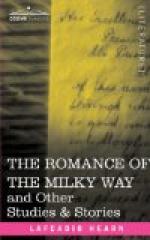[Footnote 8: Hisakata-no is a “pillow-word” used by the old poets in relation to celestial objects; and it is often difficult to translate. Mr. Aston thinks that the literal meaning of hisakata is simply “long-hard,” in the sense of long-enduring,—hisa (long), katai (hard, or firm),—so that hisakata-no would have the meaning of “firmamental.” Japanese commentators, however, say that the term is composed with the three words, hi (sun), sasu (shine), and kata (side);—and this etymology would justify the rendering of hisakata-no by some such expression as “light-shedding,” “radiance-giving.” On the subject of pillow-words, see Aston’s Grammar of the Japanese Written Language.]
[Over the Rapids of the
Everlasting Heaven, floating in his
boat, my lord will doubtless
deign to come to me this very
night.]
Kaz[’e] kumo wa
Futatsu no kishi ni
Kayo[:e]domo,
Waga toho-tsuma no
Koto zo kayowanu!
[Though winds and clouds
to either bank may freely come or
go, between myself and my
faraway spouse no message whatever
may pass.]
Tsubut[’e][9] ni mo
Nag[’e] koshitsu-b[’e]ki,
Amanogawa
H[’e]dat[’e]r[’e]ba
ka mo,
Amata sub[’e]-naki!
[To the opposite bank one
might easily fling a pebble; yet,
being separated from him by
the River of Heaven, alas! to hope
for a meeting (except in autumn)
is utterly useless.]
[Footnote 9: The old text has tabut[’e].]
Aki-kaz[’e] no
Fukinishi hi yori
“Itsushika” to—;
Waga machi ko[^i]shi
Kimi zo kimas[’e]ru.
[From the day that the
autumn wind began to blow (I kept
saying to myself), “Ah!
when shall we meet?”—but now my
beloved, for whom I waited
and longed, has come indeed!]
Amanogawa
Ito kawa-nami wa
Tatan[’e]domo,
Samorai gatashi—
Chikaki kono s[’e] wo.
[Though the waters of the
River of Heaven have not greatly
risen, (yet to cross) this
near stream and to wait upon (my
lord and lover) remains impossible.]
Sod[’e] furaba
Mi mo kawashitsu-b[’e]ku
Chika-ker[’e]do,
Wataru sub[’e] nashi,
Aki nishi aran[’e]ba.
[Though she is so near
that the waving of her (long) sleeves
can be distinctly seen, yet
there is no way to cross the
stream before the season of
autumn.]
Kag[’e]ro[:i] no
Honoka ni mi[’e]t[’e]
Wakar[’e]naba;—
Motonaya ko[:i]n
A[:u]-toki mad[’e] wa!
[When we were separated, I had seen her for a moment only,—and dimly as one sees a flying midge;[10] now I must vainly long for her as before, until time of our next meeting!]
Hikoboshi no
Tsuma muka[:e]-bun[’e]
Kogizurashi,—
Ama-no-Kawara ni
Kiri no tat[’e]ru wa.




